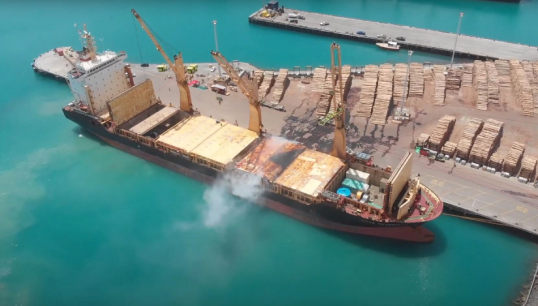Master should have authority during emergencies, New Zealand report finds
23 August 2022

Shipmasters should have the ultimate authority during an emergency onboard their vessel, a new report has concluded – intensifying a debate that was sparked by a Dutch investigation which argued that shore management should have the right to over-rule a captain in certain circumstances.
A report by New Zealand’s Transport Accident Investigation Commission (TAIC) about a serious blaze onboard a general cargoship in the port of Napier in December 2020 says that shore-based firefighters failed to give ‘due regard to the master’s command status and knowledge of the ship and its systems’.
This meant that ‘valuable time was lost’ as the master of the Singapore-flagged Kota Bahagia tried to explain the intended tactics to the officer in charge of the unified command team, investigators found. The fire was not declared officially extinguished until six days after it began and there was extensive damage to a cargo hold and its contents of high-value wind turbine components.
The fire began when gas-cutting work was taking place while cargo discharge operations were underway onboard the 18,180gt vessel. Local engineers had been using oxy-acetylene equipment to remove cargo stoppers and investigations showed that molten material had probably ignited dry sawdust from timber dunnage nearby, with the smouldering fire spreading to polyvinyl-chloride tarpaulins and other combustible components of the fibreglass project cargo.
The ship’s master had determined that the best way to tackle the blaze would be to close the cargo hold hatch and activate the vessel’s fixed carbon dioxide fire-extinguishing system. The hatch cover could not be closed until a crane wire and container spreader had been hoisted out of the hold.
However, the master told investigators, it had taken 20 minutes to secure agreement on this with the Fire and Emergency NZ team sent to the scene. ‘It is very likely that the fire would have been suppressed earlier if the crew had been able to continue with the master’s original plan,’ the TAIC report states. ‘This incident illustrates the importance of an appropriate initial engagement and exchange of information between masters and shore-based emergency responders.’
Investigators noted that a master might not be the incident controller during a coordinated response to an emergency onboard a ship in port. ‘However,’ the report adds, ‘the master retains the overriding authority to make, and the responsibility for making, decisions regarding the safety and security of the vessel. The master is responsible for the safety of life on board, the care of the cargo and protecting the marine environment from ship-borne pollution. Fire and emergency responders need to take this into account as part of their responses to ship fires.’
TAIC pointed out that it had made recommendations in 2018 on improving training and procedures for shipboard fire-fighting in response to a similar incident in the port of Tauranga.
Although guidance and procedures for ship fires have been updated, a revised training regime has yet to be compiled and implemented, it added.
‘Until the revised guidance and procedures are included in Fire and Emergency NZ’s national training programme, there remains a risk of its personnel misunderstanding shipboard emergency procedures and command and control roles when assisting with future maritime incidents,’ the report warns.
‘A shipboard fire response is based on the vessel’s design, fire protection systems and crew numbers,’ it stresses. ‘Shore-based firefighting assistance and incident management systems should enhance and support the response made by the ship’s crew, not erode it.’
TAIC also found that hot-work precautions had not been fully implemented by the ship’s crew.
Investigators said they had found evidence that non-compliance with hot work safeguards was not an isolated occurrence onboard Kota Bahagia. ‘The implementation of the prescribed precautions for hot work was not reinforced by the operator’s safety management system,’ the report adds, ‘and it is likely that the permit-to-work system had become a paperwork-only exercise.’
Tags
